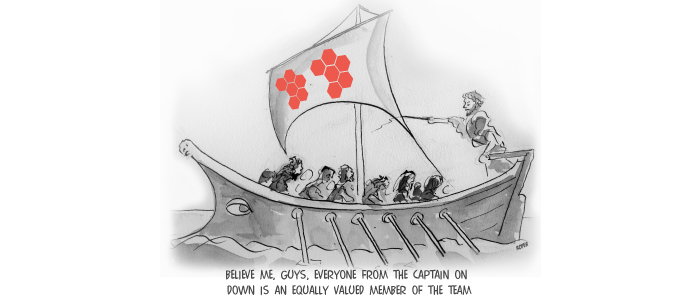There is a point, when human beings come together, that a group of individuals becomes an organism in its own right. Many leaders miss this essential insight. We are so conditioned in Western society to focus on the individual – his or her rights, duties, character, personality, skills, attributes and faults – that we tend to manage our lives and work from this standpoint.
It’s also part of the essential survival mechanism of a human being to focus from a very early age essentially on our own needs ahead of those of others– observe any toddler! So though we learn to be socialised as we grow into adulthood, many people retain this primary focus. When push comes to shove, we look after ourselves and our own, ahead of the group, team, community or organisation. Altruism is a learned overlay.
But what truly mature human beings and inspired leaders understand is that formal groupings of people take on a life of their own, quite distinct from the one-on-one relationships that random groups of people have. Like a hive of bees, a flock of birds or a shoal of fish the group becomes, however fleetingly, an organism. And organisms have rules of their own which, when they are operating at their best, override the narrow focus on the individuals in the group.
Think about a beehive. If we regard the beekeeper as the leader of the hive for the moment, think about how they manage the hive. It would be crazy for the beekeeper to take an individual bee and carry out a check on its health and wellbeing, or to examine its function and how it carries out its role, in isolation from its group. The bee’s behaviour only has meaning in the context of the hive and of its bee counterparts.
Yet how often do we do exactly the same thing in our human organisations, from families to businesses? We talk about the ‘problem child’, the disruptive team member, the departmental silo that doesn’t deliver. In our work, this is very often the starting point for a conversation with a frustrated business leader, and we are asked to help resolve the problem from the perspective of the individual.
But your organisation has become an organism – it’s developed a dynamic of its own. The vast majority of people don’t come to work to do a bad job and be disruptive. The individual you are worried about doesn’t want to be like that – and it’s almost always not an individual problem. They are only like that in the ‘hive’ of their team, family or organisation (family therapists have cottoned on to this!). So the answer doesn’t reside in taking the individual person or department and trying to ‘fix’ them. Lead and manage the ‘hive’ as a whole: examine its environment, its interactions, the written and unwritten rules it operates by, the focus (individual or group) of its members. And don’t do it by yourself – that’s just more of the same!
Some conversations are only relevant held as a group. Questions like:
- What are the basic groundrules around here, and what should they be?
- How should we run our meetings?
- Where are we going and are we all really on board?
- What are our values and how do we all uphold them?
- What behaviour is and isn’t acceptable between us?
- Who is accountable for what and to whom?
- What does it actually mean to ‘be accountable’ anyway?
These are all conversations which you and your colleagues should hold together – with outside help if you find it at all difficult . Negotiate the rules and thrash out solutions which work for everybody. That way everybody takes ownership of the groundrules and the behaviour, and you as leader no longer need to pull the strings personally with each individual or department.
Your role and that of other group or company leaders changes, freeing you up to grow your business, to achieve inspiring targets, and to empower and grow other leaders. The world needs leaders whose focus has moved on from the security and protection of themselves or their own small tribe, to the creation of truly functional groups, businesses and communities with a global perspective.
[callout title=”Shift your perspective and that of your organisation” button=”Contact us” link=”/services/organisation-development/” buttoncolor=”white, yellow, orange, red, blue, green, gray, black, alternative-1, alternative-2, alternative-3″ target=”_blank or _self”]Understand your group’s behaviour and how to manage it[/callout]
